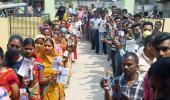A high-level panel on 'One Nation, One Election' studied election processes in seven countries including South Africa, Sweden and Belgium, before recommending simultaneous polls for Lok Sabha and state assemblies in India.

The other countries where simultaneous elections are conducted are Germany, Japan, Indonesia, and the Philippines.
The Union Cabinet on Thursday approved bills to implement 'One Nation, One Election,' and the draft legislations are likely to be introduced in Parliament in the ongoing winter session, sources said.
The decision was taken at a meeting of the Union Cabinet chaired by Prime Minister Narendra Modi.
The panel led by former president Ram Nath Kovind had submitted its report to his successor Droupadi Mumu in March recommending simultaneous elections for Lok Sabha and state assemblies as the first step followed by synchronised local body polls within 100 days.
In September, the government had accepted the recommendations of the committee.
According to the report, a comparative analysis of other countries was drawn while dealing with the issue of simultaneous elections. The aim was to study and adopt the best international practices to ensure fairness and transparency in elections.
"In South Africa, voters cast their ballots for both the National Assembly and Provincial Legislatures simultaneously. However, municipal elections are held separately from provincial ones in a five-year cycle. On May 29, South Africa will hold its general elections to elect a new National Assembly as well as the Provincial Legislature for each province," the report said.
The panel noted that Sweden follows the proportional electoral system, which means that political parties are assigned a number of seats in the elected assembly based on their share of votes.
"They have a system where elections for the parliament (Riksdag), county councils and municipal councils all take place at the same time. These elections occur every four years on the second Sunday of September whereas elections to the municipal assemblies occur on the second Sunday of September, once every five years," it said.
Subhash C Kashyap, member of the high-level committee, supported the German model of a constructive vote of no-confidence in addition to the procedure for the appointment of chancellor made by the Bundestag.
"He also explained the process that is followed in Japan. In Japan, the prime minister is firstly appointed by the National Diet and thereafter accepted by the Emperor. He advocated adoption of a model similar to German or Japanese model. This, in his view, will also be beneficial to India," the report said.
Since 2019, Indonesia has been conducting simultaneous elections, a system under which the president, vice president, and members of both national and regional legislative bodies are elected on the same day.
"Voters cast a secret ballot and dip their fingers in indelible ink to prevent duplicate voting. Political parties need 4 pc of votes to qualify for the national parliament. A presidential candidate needs more than 50 pc of votes cast overall and at least 20 pc of votes in more than half the country's provinces to win.
"On February 14, 2024, Indonesia successfully conducted simultaneous elections. It is being termed as the world's largest single day elections since nearly 200 million people voted across all five levels -- president, vice president, members of parliament, members of regional assemblies and municipal elections," the report said.










